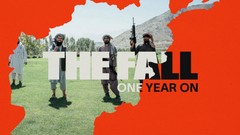The Taliban prohibit same-sex relations, and offenders were executed during the Islamist group’s previous rule from 1996 to 2001. Under the U.S.-backed former government, homosexuality was punishable by imprisonment, but many queer people interviewed for this article said they felt relatively safe as long as they went about their queer lives in private. But with the Taliban at the helm, they say their lives are now in danger.Last year, a Taliban judge told a German news outlet that he prescribed two kinds of punishment for gay men: stoning or having a 3-metre-high wall fall on them. “The Taliban regime is truly the dark ages for Afghan LGBTQ people,” Shir, a 21-year-old artist, told VICE World News from Kabul. Shir is gay, and he said many queer Afghans aren’t stepping out of their homes, even to buy groceries, for the fear of being accosted by the Taliban. “Many in our community are just waiting for their deaths,” he said.“In the Taliban regime, there is only one way they treat someone like me: death.”
Taliban’s occupation of Afghanistan has been followed by multiple reports of human rights violations, including abuses against LGBTQ people. Photo: Elise Blanchard / AFP
“The Ukraine war changed everything, and we really got to see the true faces of the international community who didn’t think twice about sending resources for the people of Ukraine, but when it came to Afghans, there wasn’t much they could do.”Despite the many evacuations, the country of nearly 40 million continues to see many more fleeing to neighbouring Iran and Pakistan every day. Many carry the scars of torture they faced back home.“Humanitarian visas for Afghan refugees are scarcer than the rarest resources in this world.”
Members of LGBTQ community from Afghanistan stage a protest in Pakistan’s capital Islamabad on August 11, 2022, calling for evacuation to third countries. Photo: Aamir Qureshi / AFP
“Then one evening, they beat me so much that I fell down like a dead person,” he said. The officials went to sleep, presumably thinking Saraj was too weak to get up. Saraj took that opportunity to escape. Today, in Pakistan, Saraj is still in hiding. “Once the Taliban has an order against you, your life is destroyed. You’re not safe anywhere,” he said. A series of 60 interviews with LGBTQ Afghans released by Human Rights Watch and OutRight Action International this year confirmed the increasing and targeted attacks on the country’s queer people. Sara, a non-binary gay Afghan, told VICE World News that they were accosted by Taliban officials outside their apartment in January. “They had knives and guns. They said ‘Shame on you, it’s our time to finish people like you,’” Sara said. They were then stabbed 18 times. “There was one stab near my heart but fortunately it wasn’t so deep,” they said. “I lost consciousness and when I opened my eyes, I was in the emergency room.” Sara is currently in Pakistan awaiting resettlement in a third country.“They tied my hands and legs to an iron rod and threw ice water on my head every night while trying to film my ‘confession’ that I’m gay.”
Members of the Taliban sit overlooking the Kabul city at the Wazir Akbar Khan hill in Kabul. Photo: Mohd Rasfan / AFP

